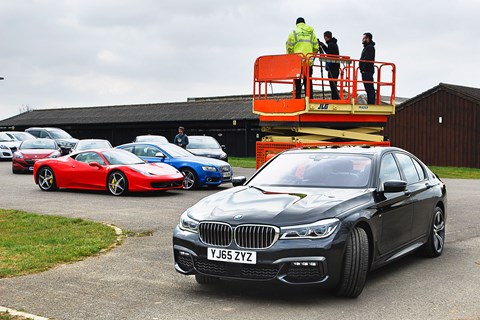You’d swear it was a smaller car. Hard to credit, when you fling it ill-advisedly at a tightening corner, that the back wheels currently defying physics in applying 457lb ft of torque to the road are so far away. This 7-series feels like you’ve got it in your pocket, like it’s part of you.
There’s none of the S-class’s squat or dive, none of the A8’s waft or wallow, just a clinical approach to the business of ground-covering without drama. Stick the adaptive suspension in Sport and the car drops by 10mm on its self-levelling air suspension, beginning a conjuring trick that encourages fast but imprecise locomotion through corners without either understeer or breakaway (you wouldn’t want the latter – despite weight-saving carbon core technology it’s still 1755kg of momentum). And all this while maintaining, via variable damper control and electromechanical roll stabilisation, your rear-seat passenger’s focus on the FT.
This isn’t a road test, but I did ask you a couple of months back to remind me to tell you what the 7-series is like to drive (it’s easy to get bogged down in tech, after all). And from under the chauffeur’s hat it does feel special. The throttle is so sweet I expect it to bring me an apple at the end of term. Modulating it is like dancing with Darcy Bussell, a masterclass in effortless weight shifting and tremendous sweep, and its relationship with the well-judged electric steering is for life. It’s a confidence thing. Only Porsche gets close to such perfectly synergised control systems.
Said synergy enters some kind of alternate dimension when you press the Adaptive button, to access a part of BMW’s brain which (scarily) learns your driving style, adds the data to intel gleaned via onboard cameras and sat-nav, and constantly tinkers the chassis, suspension and dampers to tailor refinement. It’s a bit like Merc’s Magic Ride control, in that I have no idea how/if it works, but the ride is like the Eurostar on the French side, if marginally less compliant than the S-class.
You hardly notice the work of the eight-speed auto ’box, but it’s sympathetic to the whims of the 3.0-litre turbodiesel, which in itself is thrustier than its vital stats suggest. It all hooks up beautifully. What’s really clever is that, for all the digital trickery and chip-fed boffinry on board, BMW has remained loyal to the ultimate driving machine ethos, leaving you with three out of five senses fully entertained (it doesn’t taste or smell that special). Analogue satisfaction in a digital age. I’ll take that.
But if this isn’t a road test it also isn’t a brochure, and demerits exist. Here’s the juiciest: twice, when reversing confidently into a space, the car has suddenly slammed on the anchors, sending all occupants into shock and spilling coffee. The common denominator seems to be that in both cases (one in a multi-storey, one in my driveway) I passed close to a post. The sensors, perhaps, decided I was about to hit something (which I wasn’t). This is more embarrassing than Britain’s Got Talent (which it hasn’t).
Logbook: BMW 730d M Sport
Engine 2993cc 24v inline six, 261bhp @ 4000rpm, 457lb ft @ 2000-2500rpm Transmission 8-speed auto, rear-wheel drive
Stats 6.1sec 0-62mph, 155mph, 129g/km CO2
Price £68,180
As tested £84,465
Miles this month 971
Total miles 8968
Our mpg 40.4
Official mpg 60.1
Fuel cost £125.21
Extra costs £0
Read more from the June 2016 issue of CAR magazine
